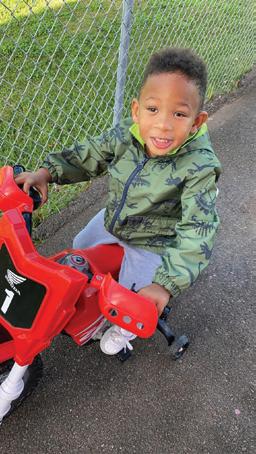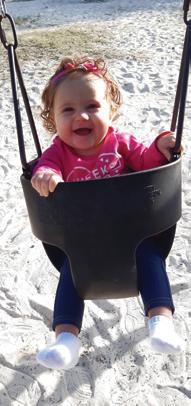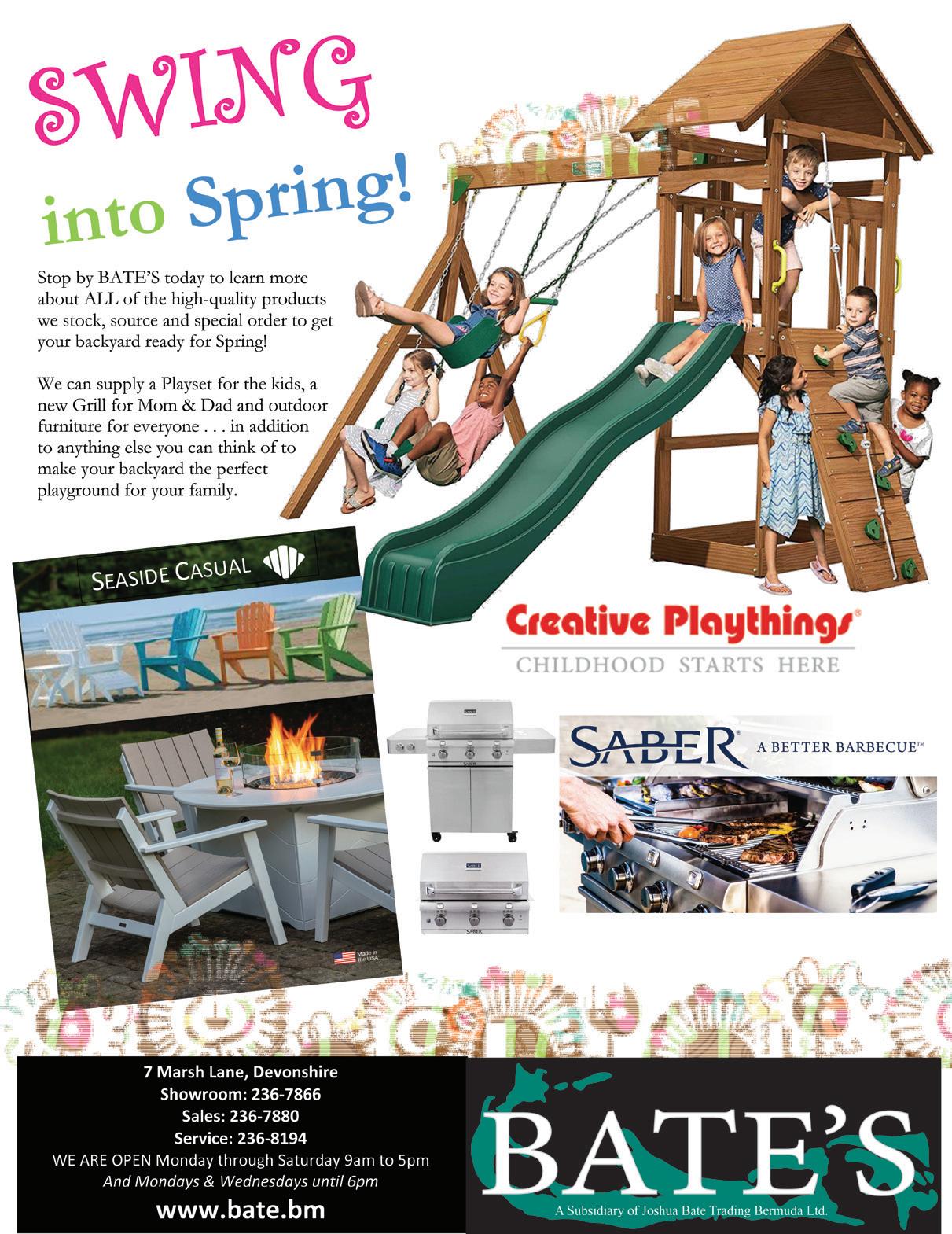




PUBLISHER & EDITOR






PUBLISHER & EDITOR
BUSINESS CONSULTANT
Vic BallADVERTISING SALES
Wanda Brown
wanda@knbmediagroup.com
333-1925
DESIGN & PRODUCTION
Picante Creative
WRITERS & CONTRIBUTORS
Alicia Resnik, Jessica Maiato, MSA, Bermuda Center for Creative Learning, Jill Davidson, Open Airways, BEDC, Bates, Safe Camps, Dorothy Bradshaw
CONTRIBUTING PHOTOGRAPHERS
Two & Quarter Photography
Bermuda Parent Magazine is published four times a year. Reader correspondence, photo submissions and editorial submissions are welcome. We reserve the right to edit, reject or comment editorially on all material contributed. No portion of this magazine may be reproduced without express written consent of the publisher. The opinions expressed by contributors or writers do not necessarily reflect the opinions of this magazine. Distribution of this product does not constitute an endorsement of the products or services herein.
CONTACT US info@knbmediagroup.com
Tel: 504-2937
www.mybermudaparent.com
facebook.com/bdaparentmag
Spring brings thoughts of new beginnings. New life, new ambitions, new hope, new dreams. The first published Bermuda Parent Magazine was 2 months after the birth of my second child. He is now 8. I didn’t have a background in journalism, marketing, business or writing. One could say, I have been in school for 8 years. In the last 3 years, I have been homeschooling both my boys and I have certainly grown as a parent and a person. I have much more respect for teachers than ever before, as well as the need for structure and discipline in my own life. I say all this to simply say, that often we think our personal dreams as parents can never be accomplished because they are too hard, too far away or we put everyone else’s needs before our own. My advice is if you have a dream or a goal that you are struggling with or have put on the back burner, take it out – dust it off. Start with small steps, take the step of faith and start before you are ready! Once you start you will have to follow through and figure it out.
In the words of Marie Forleo, “Everything is Figureoutable!”
With much love to my fellow parents,
Publisher & Editor




With the Select Invest Accumulator Plan from Butterfield and regular monthly contributions—from as little as $250 per month—your money is automatically working harder for you through one of Butterfield’s four separate “fund-of-funds” investment portfolios.

It’s time to make your investments count. There’s a Select Invest portfolio to suit the goals and risk tolerances of virtually any investor.
For more information and an appointment to discuss your investment needs, please contact us on 299 3817, email us at invest.bermuda@butterfieldgroup.com or visit our website.
One of the most difficult questions a new parent may have is: “who will watch their child when they have to return to work?” A parent has spent nine months waiting for the baby’s arrival and helping them through their first months in the world. Now trust must be placed in someone else for their baby’s care, safety and growth for hours a day. Who can meet this considerable responsibility?
The Child Care Regulation Programme (CCRP), is tasked with

licencing Day Care Centres and registering Day Care Providers (persons who care for children in the home) as per the Children Act 1998 and the Day Care Centre Regulations 1999. The process for receiving a licence or registration certificate requires vetting of the staff/provider, review of the safety of facilities and ensuring policies and procedures are in place.
The ultimate goal of every stakeholder – parent, provider and the child care programme, is to have happy, health and safe child care in Bermuda.
We know parents have questions about the quality of the child care setting they choose. Right now there really is no way to differentiate beyond a visit and word of mouth. Starting in 2021, the Child Care Regulation Programme will be implementing a star rating system that will review the Day Care Centre and Providers on 14 different areas including: activities for the children, management of the home or facility, policies and procedures, vetting documents and children’s documentation. Right now, oversight of the child
care settings includes visiting Day Care Centres and home Day Care Providers on a regular basis. Between September and December last year, the officer completed a total of 78 visits to the 41 Licenced Day Care Centres and 58 visits to the 55 Home Day Care Providers.
These visits can be for a variety of reasons: complaint investigation, monitoring visits, request for assistance from the day care centre owner/ operator or provider. We document all of these visits and complete follow-ups where necessary.
In addition, the Child Care Regulation Programme oversees the vetting of staff (350 +) and home day care providers (55). This includes requiring: a criminal background check, medical clearance form, a Department of Child and Family Services review, and references. The DCFS form and the Criminal Background check will be redone every two years and the medical clearance form, every five years.
The Programme is also critically aware of the importance of Early Childhood Education and the need to support the persons who are caring for our children to advance their learning. Ninety percent (90%) of brain growth occurs before a child enters first grade (5-years-old) and 80% of that growth has occurred by the time the child is 3-years-old. The quality of the child’s experiences during this time of incredible growth has a lasting impact on their future. While a baby is born with all of the brain cells they will have for the rest of their life, as they grow and develop it is the connections between these cells that make the brain work and are vitally important.
The early years are the best opportunity for a child’s brain to develop the connections they


need to be healthy, capable and successful adults. During these critical years, our children have many important persons in their lives that will take part in shaping them and can include – their parents, grandparents, other siblings, and their caregivers.
The Department of Health estimates that 90% of Bermuda infants and toddlers, are in a child care setting – day care center or home – before school age. This care can be anywhere from 4 hours to up to 9 hours a day. That is a lot of time for the child to learn, grow and develop. That is why it is critically important that the persons who care for our children in Day Care Centres or in their homes for up to 9 hours a day have the education, support and ongoing guidance to assist with the critical development our children need.

There have been a lot of changes in the Child Care Sector, but as everyone can agree – we need higher standards for our children. They all deserve the best start in life and that begins from birth. We need to support those persons who care for our children outside of the home and everyone needs to be onboard to make this work.
For more information and a list of Licenced Day Care Centres and Registered Day Care Providers visit: https://www.gov.bm/ child-care-regulation-programme and if you have any questions or concerns you can contact the Child Care Regulation Programme on: 278-4900 or childcare@gov.bm.
Until about 70 years ago, scientists believed that as we drift off to sleep, our brains and bodies would shutdown and enter a simple dormant state. What has since been learned is that sleep is a more complex and active process than previously understood.
As we sleep, our brain cycles through patterns of activity which can be divided into distinct stages. In an adult with healthy sleep, as long as there is no interruption, this cycle repeats every 90 to 110 minutes until we awaken. First, there is the non-rapid eye
movement or Non-REM stage, which can be described as a period of deep sleep. In adults, this Non-REM stage can be further divided into 4 phases. The Non-REM stage is followed by the shorter rapid eye movement or REM stage, a period of active sleep which is characterized by dreaming.
The sleep cycle of infants and young children up to ages 3 or 4 differs from that of adults. With quality sleep an essential factor in early childhood development, these differences are important to note for the conscientious parent.
 BY DOROTHY BRADSHAW
BY DOROTHY BRADSHAW
• Newborns (babies up to 12 months of age) have a simple sleep cycle, averaging 45 minutes for the first nine months of life. The newborn sleep cycle has only two stages –active and quiet sleep.
• When a newborn first falls asleep, they enter active sleep (similar to adults’ REM sleep). During this stage, newborns are also more likely to wake up. A newborn will typically spend about 50% of their sleep cycle in this stage (as opposed to an adult spending only 20%).
• About halfway through the sleep cycle, the newborn falls into quiet sleep. This is characterised by slower, rhythmic breathing, less movement and no eyelid fluttering. At the end of the sleep cycle, the newborn will either wake up or return to active sleep.
• It is not uncommon for newborns, particularly those still in the 4th trimester (the first 3 or 4 months of life) to cat-nap and wake up frequently (45 minutes or less of sleep time), no matter the time of day or night. They simply wake up as one sleep cycle ends.
• Newborns typically start to produce melatonin (sleep hormone) at 8 to 10 weeks old. This helps to establish sleep cycles, lengthens naps and can make attempts to consolidate sleep (transition from one cycle to the next without interruption) easier.
• The duration of your child’s sleep cycle will increase as they get older. It will start to resemble that of an adult as they approach their 3rd or 4th birthday.
• REM and non-REM sleep duration will change as your child’s nervous system matures. The younger the child, the longer their brain will remain in the active (REM) stage of sleep. Why is this important? REM sleep (when we dream) is lighter and easier to be woken up from.
• ‘Premature’ babies (those born before 30 weeks of gestation) may initially spend up to 70% of their sleep in the REM stage, while infants born ‘on time’ may initially spend only 50% in the REM stage. Five year old children however, will typically have a 70/30 distribution between Non-REM and REM sleep.
Best practices for parents of newborns and toddlers include:
If you are struggling with short naps and frequent night time wake ups, you may be keeping your child awake for too long. Common symptoms of an overtired child include waking up after 30 mins from a nap and waking up frequently, even as often as every 45 mins after falling asleep at night. The table below shows average recommended awake-time duration (time between naps / bed) for various age ranges
Wait before you rush in Children tend to be quite vocal in their sleep, particularly when transitioning between sleep cycles. They may cry out, moan, grunt, squeal, thrash about, etc. and though it may seem they are awake or distressed, they may actually be in an
– 2:00 (3 naps)
7 – 15 2:30 in the AM and 4:00 between 2nd nap and bed (2 naps)
15 – 18 4:30 – 5:30 (1 nap)
18 – 24
5:30 – 6:30 (1 nap)
active sleep stage. Your well-intentioned efforts to go into their bedroom and help may actually wake them up. Developing the ability to discern the signs of true wakefulness as well as the patience to wait before intervening, will be beneficial in the long term as it can help your little one learn how to resettle on their own.
Another behaviour you may have noticed is the propensity of your child to wake up in the early morning hours (between 4am and 6am). For adults and children alike, each consecutive sleep cycle (from night to day) increases the proportion of time spent in REM sleep. With the REM stage the more active phase of sleep, it becomes easier to be woken up the longer we have been in bed. You can decrease the likelihood of your child waking too early by taking steps to restrict external noises and light from disturbing your child, as well as providing a proper room temperature.
Finally, say your beloved child decides to start their day at 5.30am. You go in, turn on the lights, crank up the radio, serve breakfast and play with them. Their circadian rhythm, or internal clock, thinks its morning. A bit early, right? External modulation through social interaction, light, food and temperature affect the internal clock, which regulates the sleep-wake cycle. By progressively delaying your response to their morning wakefulness, you will allow their internal clock to recalibrate to a more desirable setting.
Dorothy (Wysocka) Bradshaw is passionate about helping families get the sleep they need. In addition to her Masters in Public Health, she is trained as an infant and child sleep consultant.
She has helped families with sleep related issues ranging from multiple night time wake ups, to developmental sleep regressions, to moving from bed-sharing to their own crib, to establishing healthy sleep associations through cat-napping, to nap-refusal, to staying in bed all night, to early morning wake ups and the list goes on.
She invites you to visit her website www.the41stwink.com or contact her via email at the41stwink@gmail.com
“If you are feeling exhausted, helpless, overwhelmed, or just don’t know how to help your little one get the sleep they (and you!) need, please reach out to me – together we will find a solution that works for your family.”
Sources:
Jodi A. Mindel, Judith A. Owens. A Clinical Guide to Pediatric Sleep: Diagnosis and Management of Sleep Problems.
Kushida C. Encyclopedia of Sleep. Goodlin-Jones BL, et al. Night waking, sleep-wake organization, and self-soothing in the first year of life. J Dev Behav Pediatr 2001 Aug;22(4):226-33.
Sadler S. Sleep: what is normal at six months? Prof Care Mother Child 1994 Aug-Sep;4(6):166-7.
Armstrong KL, Quinn RA & Dadds MR. The sleep patterns of normal children. Medical Journal of Australia 1994 Aug 1;161(3):202-6




And your plan. At BF&M, our goal is to help you live the best life you can with the money you have. Of course we’re focused on making your money work as well as it can. But we don’t just look at your return on investment; we look at your return on life. That means financial planning that works for you now and for the future, so you can go on loving life—the way it should be.


Hand strength is imperative for children to perform many functional skills. Climbing trees, swinging on monkey bars, opening lunch containers, holding a crayon, putting on socks, cutting with scissors and the list goes on….
Today, you get to make your very own “Tennis Ball Muncher”!
This easy make & take activity will provide your child with a new toy that not only is fun and versatile, but also a wonderful device to develop the muscles of their hands.
Get ready to make this hand strengthening tool for your home or classroom.
Materials:
• Old tennis ball (If you need a whole class set, contact one of the local tennis clubs. They can let you know when they have a box of old balls to donate to you)
• Sharp knife
• Colourful sharpie markers
• Small items (pennies, beads, tiny legos…)
• Zip-tie (if you want to have a handle for your muncher
Steps:
1. Ask an adult to cut a slit in the side of your tennis ball. If you can make it curved…then your muncher will have a smile! The width of the slit makes a difference. The wider the slit, the easier it will be to squeeze it open.


 BY JILL DAVIDSON, OCCUPATIONAL THERAPIST, FUNCTION JUNCTION
BY JILL DAVIDSON, OCCUPATIONAL THERAPIST, FUNCTION JUNCTION
2. Decorate your muncher with the sharpies. Add eyes, lips, hair…or write your name.
3. Now it’s time to play! Squeeze to make him talk.
Ways to Hold your Muncher
• Younger children may need squeeze with two hands initially. Place thumbs on one side of the slit and fingers on the other. Squeeze to open the mouth.
• Ideally, we want to hold the muncher in one hand, with the thumb on one side of the mouth and the index and middle fingers on the other side of the mouth(slit)
Ways to use your Muncher….
In the car…
• Put on the radio! Make your muncher “sing” along to the music. Can you keep him singing for the whole song? Switch hands if you need to.
• Practice spelling words the morning of the test. Squeeze your Muncher for each letter as you spell it.
At Home
• Feed your hungry Muncher. Hold Muncher in one hand. In the other hand, pick up 3-4 small items, like pennies or beads and hold them in your fist. One at a time can you bring one penny out to your fingertips? Squeeze the muncher and feed him the penny. As you feed him, think of different things he could be eating, such as carrots, chocolate or bananas!
• Dance Freeze – Put on the music…dance around with a muncher in each hand. When the music is playing the Munchers both have to be singing (opening and closing mouth). When the music stops….Freeze! If the mouth is open when the music stops, you need to hold it open till the music starts again.
In the Classroom (Have enough for a class set or at least a small group)
• During morning circle, everyone has a ball. Have fun squeezing it in the right or left hand or both. Learn about Right & Left! Try holding it high in the air while squeezing it to develop more shoulder stability.

• Practice rhyming words. Teacher says a word….class thinks of a rhyming word and squeezes their muncher for each word they can think of.
• Spelling practice – Ask a student a spelling word…they must squeeze the muncher for each letter as they say it. As the students get better at this, see if they can keep a steady rhythm as they squeeze and say each letter.
• Hold the muncher in one hand….hold five pennies in the other hand. Teacher asks students math facts. If you get your question correct, you get to feed your muncher
one penny. Make sure it moved smoothly from your palm to your fingertips without dropping it or using your body or other hand to help you.
• Could be used as a fidget tool. Manipulate and squeeze the Muncher in your hand, while your eyes and attention stay focused on the teacher.
fabulous warm-up before handwriting practice.
Did you think of a new game with your Muncher? Post it in the comments on my website (www.functionjunction. bm). The first 5 to post will get free admission to Function Junction’s Parent Education event on “Developing Hand Skills for Handwriting” in May 2020.
I hope your hands are warmed up now and ready to write, push, pull, swing or hang. High Five!!!
Developmental Screenings
Full Evaluations
Written Reports
Home Programmes
Individual & Group Sessions
Classroom & Home Observations
Bike Riding
Training and Education

Holiday Camps
…and more!
Are you one of the primary providers to your young family? Do your aging parents depend on you financially? As the elderly population grows and young adults are financially struggling in trying economic times, individuals ‘sandwiched’ between aging parents and adult children are often referred to as ‘the sandwich generation’. This is because they are often put in the position to provide support for both their children and parents simultaneously, and this support is often both emotional and financial. Experts note that it is often the case that the sandwich generation is comprised of adults in the 40s and 50s that are juggling these competing responsibilities at the same time. But we can’t say the same here in Bermuda. Due to financial shifts in Bermuda, we see the sandwich generation becoming younger and younger. One out of 25 young Bermudian adults feels emotionally and financially stressed. This stress originates from ensuring that their rent is paid and food is on the table for their own children and aging parents. Their parents can be suffering with medical issues or financial issues and depend on their children to take care of them. A lot of these people will also be juggling this responsibility as well as working full-time.
Being in a sandwich generation, you likely feel like forced to ensure that rent is paid and that food is on the table. However, you might not realize that you are a breadwinner for many people
and if anything happens to you, your family will be in trouble. Do you have life insurance? It’s a straightforward and affordable way of providing your family protection to make sure that they are financially secure in the event of your death.
A life insurance plan pays out a cash lump sum if the person(s) insured dies during the term of the plan. The lump sum can be used to provide financial support to your family and loved ones, who might otherwise struggle to pay the mortgage, bills, and other living expenses without your income.
Having the right level of life assurance in place gives you peace of mind and your family a financial safety net if they ever need it.
Life Insurance is strongly recommended for those in the sandwich generation as it will ensure that whoever depends on you will be financially stable in the event of your death. Life coverage usually isn’t at the top of mind for someone who hasn’t made it to their 30th birthday yet. Generally, the younger and healthier you are when you buy life insurance, the cheaper it will be—regardless of the amount of coverage. If anyone relies on you financially, you need life insurance. It’s virtually obligatory if you are a spouse or the parent of dependent children. But you may also require life insurance if you are someone’s ex-spouse, life partner, a child of dependent parents, the sibling of a dependent adult, an employee, an employer, or a business partner. Three out of four people think
they know the true cost of coverage. However, these people do not have accurate perceptions of the cost. A term policy for a 30-year-old is less than $20 a month for $250,000 in coverage. This amount would cover the funeral cost in case of death and many more expenses. Do you know how much funerals cost? An average funeral in Bermuda runs approximately $5,000 to $20,000. Having coverage will protect the loved ones that rely on you from any expenses when you are gone. Life insurance can seem like an overwhelming endeavor if you do not take the time to determine your needs.
Being part of this growing group can be hard on the individuals involved; dealing with the stress and frustration can be challenging in and of itself. The first step to take, if you feel this pressure mounting, is to simply ask for help. Friends and family might not be willing to help in the caregiving responsibilities. However, they could be willing to help with daily chores, such as collecting and picking up kids from school or collecting laundry. One less chore for you to worry about will give you more time to yourself if you need it.

Located at 69 North Shore Rd, Hamilton Parish. Serving families in the Eastern Parishes and beyond since 1998.
Ask yourself if you are part of the sandwich generation, and if so, stop and think about what is most important to you. Seek help and learn how you can get protected. Most people keep their family and their well-being in mind as they shop around for life insurance and you should too. Consider the current needs as well as future needs for spouses, children, and other loved ones that could use protection in the case of your death. Life insurance can seem like an overwhelming endeavor if you do not take the time to determine your needs. For more information contact Jessica Maiato, Life Insurance Sales Agent on 294-4618 to see how we can cover all your life insurance needs.
Your child‘s day is comprised of opportunities to build an excellent foundation for the early years of education. Our approach to teaching provides our children with sound moral principles, exploratory learning, early literary skills, monthly Early Years programs with the Bermuda National Gallery, Bermuda Gymnastics, Music Classes with Simons Music School and Spanish.
Teachers Qualified ECE, First Aid & CPR Certification, SCARS Trained and Vetted Staff.
Accepting students 18 months to four years of age.
Hours: 7:30 a.m. - 5:30 p.m.
Currently accepting applications
2019/20. Contact us at 737-8385 or happymomentsnews@yahoo.com
In Motion started with 40 students, all of whom were taught by Founder/Director, Lizz Pimentel. Since starting with 40 students in a onestudio location, In Motion and Founder/Director, Lizz Pimentel have presented 22 Annual Dance Showcases, 9 Christmas Spectaculars, several company performances, and is home to hundreds of aspiring dancers.
This year In Motion is preparing for its 23rd annual Dance Showcase, “Our Planet”. This showcase takes a look at our beautiful and delicate planet with an eye towards education, conservation, and making the planet a better place for our children.

The Annual Showcase allows dancers to show what they have learned through the year. This years theme sees the school combining the art of dance with a cause that affects all of us. Through their dances they will explore the diverse cultures, ecosystems, wildlife, and challenges our beautiful planet faces.
In Motion is doing more than just talking about the environment and plan a number of events leading up to the show. One in particular
is a trashathon in the lead up to the Showcase. To date, In Motion has done more than a dozen dancer supported trashathons in conjunction with KBB. The trashathons allow the dancers to engage with the community in a way that gives them a feeling of social responsibility and civic pride.
When In Motion began, it was designed to offer local dancers excellent dance education in an environment that fostered a sense of pride and community. Every dancer that
walks through the doors of In Motion receives the best Bermuda can offer. The staff is rigorously trained and qualified to take dancers to the next level as performers and as people.
In Motion has always led the way when it comes to dance on the Island and thrives on innovation. Over the years other schools have mimicked the look, class offerings, even changed their name to resemble the school more closely, but have never been able to copy the quality of dance education
provided. Many times the programs are implemented poorly and taught by people without proper dance training.

In Motion has provided opportunities that were never previously available to local dancers. Their dedication to providing first-class training and experiences has enabled several of their most promising students to pursue dance careers and dance education, not just on island, but at respected institutions around the world. Places like Paul Taylor Dance Company, the Grier School, North Carolina School of the Arts, University of Arizona, New World School of the Arts, SUNY Purchase, Indiana University, Dean College, and even on Broadway with more hoping to follow similar paths in the near future.
While In Motion believes that Bermudians can succeed in the arts, the school has always been about more than just the practice and performance. Dance is about community, friendship and support. It’s about pushing your limits and becoming the best you can be. Over the years In Motion has seen their dancers grow and become teachers, dancers, actors, doctors, lawyers, parents and more.
Asked about the sense of community developed at the school, Director, Lizz Pimentel says, “For me the future is about growth and community. It’s thrilling to see my dancers return to the school either after university or with their own children to be part of the In Motion family. That sense of family and caring is vital to the schools success. In Motion has been a major part of the dance community for more than two decades and I am excited to continue the tradition of innovation and excellence into the future.”
Our aim is to have fun while developing your baby's strength, confidence and safety skills such as submerging, turning and reaching for the edge of pool.
Our focus is to teach competitive stroke technique and survival skills so your child becomes a safe, stylish and efficient swimmer.
LOCATIONS: Pembroke St. George’s
In Motion has always led the way when it comes to dance on the Island and thrives on innovation.
BERMUDA CANCER AND HEALTH CENTRE’S FREE SUNSMART ACCREDITATION PROGRAMME
Information sessions covering:
UV radiation – why is it harmful / when is it strong enough to damage?
Skin cancer – who is at risk?
Simple steps to protect skin outdoors
Importance of developing a protective and proactive camp policy
Assistance with preparing a SunSmart Policy for your camp
Protective sunglasses, sunscreen and hats provided at no charge
An on-site camp assessment of policy implementation
Choose one (1) session, starting at 5:30pm at Bermuda Cancer and Health Centre on Point Finger Rd. in Paget.
Tuesday, June 23
Thursday, June 18
Wednesday, June 17
TO REGISTER YOUR CAMP FOR THE SUNSMART ACCREDITATION PROGRAMME, CALL 236-1001 EXT.1005 OR EMAIL SUNSMART@CHC.BM.
our services:
Mammography, breast biopsy, prostate biopsy, ultrasound, bone densitometry, radiation therapy





Its summer time and all children just want to have fun! Parents are looking for safe affordable childcare. Parents, before you send your child to camp you want to make sure that they are safe, supervised and engaged in activities that keep their minds and bodies active.
The following questions are 10 suggested questions for parents to ask before you sign your child up for camp:
1. WHERE IS THE CAMP LOCATED?
Is there a suitable and safe building/ structure for the camp’s base? All programmes should meet established guidelines for indoor space, free from hazards, in good condition and meet environmental health standards.
2. WHO ARE THE STAFF OPERATING THE CAMP?
Do you do background checks on your staff? Are the camp staff CPR/First Aid trained? Are medical forms about the campers collected; how are medica-
tions stored? At a minimum, camp staff should be trained in safety regulations, emergency procedures and communications, behavior management techniques and child physical and sexual abuse prevention and reporting.
3. WHAT IS THE CAMP’S PHILISOPHY AND PROGRAME EMPHASIS?
Is the camp’s program/ activities age and developmentally appropriate for the children they serve. What does a typical day look like for the camper, what does the camp focus on? How
many hours are spent inside and how many outside in the sun? Are the campers oriented to the camp and to systems put in place to keep campers safe?
4. WHAT IS THE CAMP’S BEHAVIOUR AND DISCIPLINARY POLICY?
What are the rules and consequences? How do they use positive reinforcement? Is there a policy on bullying? What is the behavior management philosophy? Will parents or guardians be contacted in the case of problematic behavior becoming a safety issue for the child or others?
5. WHAT IS THE COUNSELOR-TOCAMPER RATIO?
Ratios and maximum group size vary according to age and activity. See the suggested ratios posted on Environmental Health’s Web site, outlined in the Guidelines for Day and Over Night Camp Administrators and the Safe Camps Bermuda Facebook page. You may wish to add the following US
based guidelines on day camp staff to child ratio for whoever is caring for your child: In day camp, there must be one senior counselor for every six children under the age of 6; one for every nine children between the ages of 6 and 7 and one for every twelve children who are 8 years old and above.
6. WHAT IS THE TRANSPORTATION/ EXCURSION POLICY?
Does the camp provide transportation? If yes, is it via pre-organized vans or buses? What are the conditions of the vans i.e.; seatbelts and driver experience. If bus, what are the checks and balances to ensure safety enroute. What is the contact number of a camp staff person that I can reach at all times even what campers are on excursions?
7. WHAT IS YOUR WATER SAFETY POLICY?
Children should not be permitted near water without supervision and a staff member who is First Aid -certified and familiar with lifesaving procedures. All campers’ ability to swim should be assessed and activities designed according to the skill level of each child.
8. WHAT IS THE TRUE COST OF THE CAMP?
What does the camp fee include? Are there other expenses? Will outside activities cost extra? Is there a refund policy?
9. IS THE CAMP REGISTERED?
All camps that take preschool age children must have their camp registered with the Deparment of Environmental Health. Other camps wishing to be given a seal of approval should also be registered as striving to meet best practice standards and keep children safe.
10. WHAT ARE YOUR POLICIES ON VISITORS AND/OR COMMUNICATING CONCERNS?
How does the camp screen visitors? Parents should make sure that there is a method for making sure that unauthorized visitors are not allowed access to their child. It’s also important for the camps to account for attendance and dismissal from camps. Parents should have a plan in place designating how the child is to leave the camp, including the names of those that have permission to visit or escort their child home.
You should also feel comfortable knowing who to lodge a concern or grievance with.
Knowledge Is Power: For More Information


Visit Our Facebook Page Safe Camps Bermuda


Total immersion etiquette camps for girls and boys aged 7 to 13. Teaching poise, confidence, integrity, making good choices in life and leadership. Classes include etiquette instruction, social skills role playing, arts and crafts as well as afternoon tea. Classes are held school half term breaks and summer holidays.
Contact us about upcoming Summer camp dates in July and August 2020.
Additional classes:
Academy for Young Ladies: Ages 14 to 18 years
Intensive Etiquette and Protocol: 3-day course for men and women, ages 19 years and up.
“Where etiquette is not only taught - it becomes a way of life”.

Etiquette Educator Certification: Train to become a certified instructor using the established Executive School of Protocol business model for the ‘Young Diplomats of Bermuda’ program. Hands on experience actually working with children in a live classroom setting. For information on all programs contact: tsnaith@ibl.bm; 441-505-8358; www.esop.bm
Finesse Productions
Style and Fashion 2 Week “FASHION CAMP” for Primary and Middle School Girls ONLY
Where: Dellwood Middle School, 1 North St., Pembroke
When: July 6-25, 2020
Time: 8:30-3:00
Cost: $100.00 a week
Sibling rate: $180.00 for 2
$25 Non-refundable registration by email tweeks@transact.bm no later than May 31st
Highlights:
• Field Trips
• Communication Skills
• Etiquette/Grooming
• Art
• Swimming
• Mini Fashion Show (The last week)
Contact: 799-9360 or tweeks@transact.bm
Bermuda National Trust Camps
We offer week-long camps for 8-11 years old students. All include excursions to Bermuda National Trust nature reserves and historic houses to inspire wild creativity with preservation and conservation at the heart. Children play games, create art, learn how to design upcycling projects and crafts, build forts, explore trails and develop coding/logical thinking and building skills while building LEGO robots with our Trust-Ed staff. These camps emphasize project-based learning and “Each One, Teach One” mentorship.
Camp held in July and August—contact us for dates!
For more information please visit our website at www.bnt.bm, email education@bnt.bm or call 236-6483.
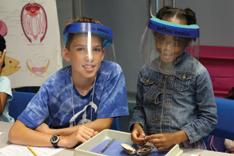
BNG Art + Technology Lab Summer Camp, is a creative digital artmaking programme for middle school students ages 11 - 14. Students will learn creative ways to create their own online artist’ storybook using an iPad. Students will explore drawing, photography, graphic design, as well as creative writing. *Scholarships also available for students, for criteria details please enquire with BNG. For more information about the programme and our July or August dates or to register, please contact education@bng.bm or call 295-9428.
BUEI Ocean Discovery Camps are designed to inform, motivate and excite children using hands-on activities, experiments, interactive computer learning, scavenger hunts, arts & crafts and competitions.
Lil’ Explorer Camps immerse children in the exciting ocean world through explorations, fun interactive games, art and play. BUEI Ocean Discovery Camps are geared towards children aged 7-13 and Lil’ Explorer Camps are for ages 5-6. Camps are held from 9am to 3pm with camp supervision available until 5pm. For more information visit buei.bm or call 294-0207.
Padma

Learn how to FLY this summer! Our circus summer camp is coming to town! Here, you’ll learn acrobatics, hand-balancing, contortion, tight rope, juggling, as well as the classic aerial arts of Silks, Hammocks, Lyra/ Hoop, Cube and Trapeze. Ages 5-16 are welcome. Camp runs Mondays to Fridays, 8am - 5:30pm. Spots fill up quicklyEmail info@padmabermuda.com to reserve your spot now.
iSwim
iSwim to win! Sign up for iSwim’s summer stroke development intensives or intensive summer swim camp and find out what winning means to you! All children must be able to swim ten metres unassisted of a recognisable stroke to be eligible for both programmes. All classes take place at the NSC. The stroke development intensives are offered:
Session 1: Mon-Fri Jun 29th - Jul 3rd. 10, 10:30, 11 or 11:30 AM or 4, 4:30, 5 or 5:30 PM.

Session 2: Mon-Fri Jul 6th - Jul 10th. 10, 10:30, 11 or 11:30 AM or 4, 4:30, 5 or 5:30 PM.
Session 3: Mon-Fri Jul 13th - Jul 17th. 10, 10:30, 11 or 11:30 AM or 4, 4:30, 5 or 5:30 PM.

The camp is offered:
July 20th - July 24th 2020 8:15 AM - 12:15 PM
For more information, contact iswimbermuda@gmail.com



CONNECTECH Coding is Bermuda’s first technology training center providing the youth with education and training opportunities. Students who learn to use technology in advanced methods will provide themselves with a variety of local and international opportunities. We see the trend for technology skills rapidly accelerating over the next decade. This explosion will include but not be limited to Artificial Intelligence (“AI”), Massive Data, Smart Cities, Robotics, Autonomous Vehicles, and IoT. By exposing our youth to coding and technology principles at an early age will provide them with many skills such as problem solving, communication, collaboration, computational and critical thinking. Our vision is for our youth to be at the forefront of the technology industry developing major software applications for both local and international deployment.

For more information on Connectech Coding and its program offerings please visit www.connectech.bm

Bermuda Cricket Board Easter & Summer Cricket Camps!

Come play cricket, learn drills, skills and more with internationally certified coaches
Easter Camp Dates: April 1 – April 5
Summer Camp Dates: June 29 – July 25
Time: 7.45am – 3pm (after camp 3pm-5.30pm)
Cost: $120 per week (after camp $50 per week)
Easter Camp Location: West Pembroke Primary School
Summer Camp Location: Warwick Academy
Registration: Bermuda Cricket Board or www.cricket.bm



Charities House, 25 Point Finger Road, Paget, DV 04
T. 292 8958 F. 292 8959
E. info@cricket.bm
Word of Life Teen Camps are week long adventures in fun & character development. Campers learn from great youth speakers and participate in activities like: swimming, tubing, cliff diving, soccer, crafts, kayaking, rock-wall climbing, & fun-filled team games. Open to all Middle and High School teens (11-18 yrs). Price: $275 per week with sibling discounts available. Dates: July 13-18, July 20-25, August 3-8 & August 10-15. Call 232-9673 or email carla@wolbermuda.org for more information.
Wide variety of sports with the emphasis on having fun and appreciating what all sports have to offer! Imagine PE class all day every day!
Children 6-13 years old during the month of July from 8:30 – 4:30 pm.
Cost per week $220 After camp care is $5 per day!
Da-Von Wade at dwade@somersfield.bm
DanceSations
Summer Program: Preballet, Ballet, Jazz, Modern, Hiphop, Adult classes starting Jun 26th - Aug 29th. Price per term $175. Ages from 2 to Adult. Classes held Tuesdays, Fridays and Saturdays.

Centre Stage Dance Camp: Ballet, Jazz, Hip-hop, and Modern dance. Creative workshops in drama & choreography, outings, dress up and so much more! Kids will perform in our Annual Summer DanceSations Dance Recital. Time: MondayFriday 8:30 am - 5:30pm. Aug 3rd - 28th. Ages from 6-18. Cost $185 per week. Call 292-4100 for more information or visit www.dancesations.bm to register!


The Evangelical Church of Bermuda
2020 SUMMER PROGRAMS
VACATION BIBLE SCHOOL
Time: 6:15 PM until 8:30 PM
Children born between 2008-2015
(Ages 4-12, completed preschool-M1)

Date: June 28 – July 2 (Sunday – Thursday)
FREE Register online
www.evangelicalchurchbermuda.com
Or email: dinahc@ecb.bm
JUNIOR CAMP
Place: Grace Island (Overnight Camp)
(Ages: 8-12 years - Children born 2008-2012)
DATE: July 6-11
Cost: $300.00 per camper ($275.00 second child) Register online by June 26 (Space is limited) www.evangelicalchurchbermuda.com


Or email: dinahc@ecb.bm
Buffalo Seminary
The Sleepaway@SEM Equation: Subtract boys. Add girls ages 12-15. Add SEM alum counselors to be the positive female role models girls need. The result? An environment that creates empowered girls who try harder, sing louder, and have more fun!
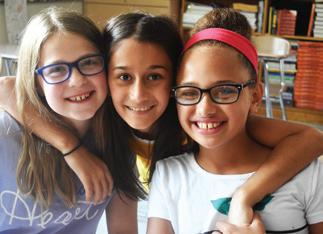
July 12-August 1 for 1, 2 or 3 weeks! Girls stay in our historic home student residences to practice safe independence while making friends for life with girls from around the block and around the world. Our camp stresses fun, creativity, and confidence, and offers an orientation to U.S. high schools session. With Arts & Crafts, Writing, Upcycling Fashion Lab, Coding, Sailing, Crew & Golf.
Register at buffaloseminary.org/SAS. For information call (716) 885-6780 or check out Facebook.com/SummeratSem or Instagram/summeratsem.
Buffalo Seminary 205 Bidwell Parkway Buffalo, NY 14222

Bermuda Gymnastics Camp is Super Fun!!
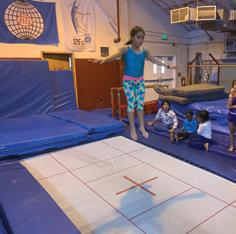
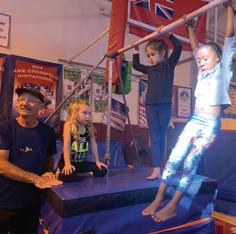
SUMMER CAMP 2020
WEEK 1: June 29th to July 3rd (Amazing Race)
WEEK 2: July 6th to 10th (The Circus)
WEEK 3: July 13th to 17th (Sports Challenge)
WEEK 4: July 20th to 24th (Around the World)
WEEK 5: August 3rd to 7th (Olympic games)
WEEK 6: August 10th to 14th (Ninja Challenge)
WEEK 7: August 17th to 21st (Reef Explorers)
WEEK 8: August 24th to 28th (Halloween)
SPRING BREAK CAMP (March 30 - April 3 to April 6 - 9)
OCTOBER MID TERM CAMP (October 26 - 30)
5% discount offered on the Summer Camp for those attending February Break Camp or Spring Break Camp
AGES 4 to 12 years old
SCHEDULE
**Full Day: 9:00 am - 4:00 pm $315 per week

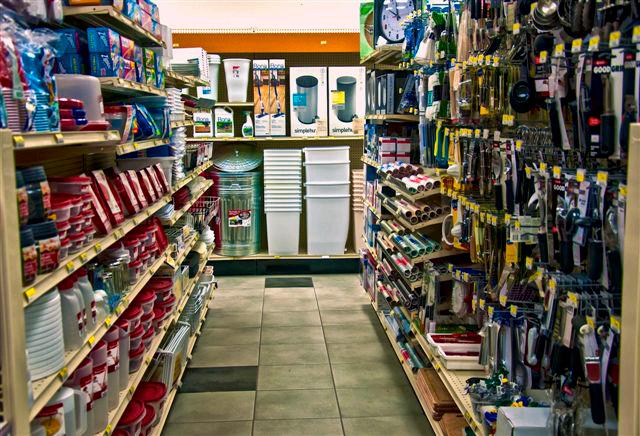
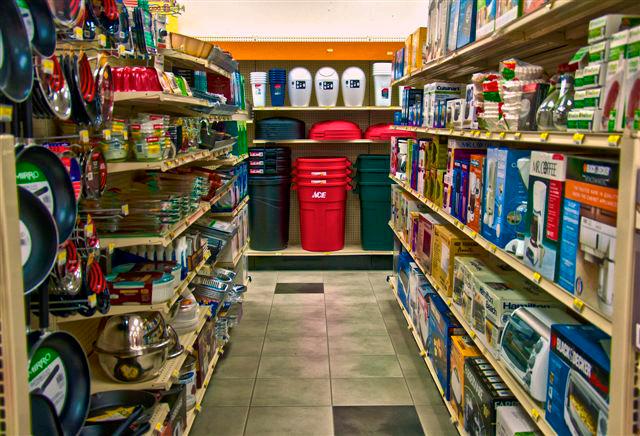
**Early drop off (8:30 am), late pick up (5:30pm)
Half Day: 9:00 am to 12:30 pm or 12:30 pm to 4:00 pm $215 per week
National Training Centre, 35 Southside Rd. St. Davids
441 295 0589
bgainfo@bermudagymnastics.bm
WWW.BERMUDAGYMNASTICS.BM



Saltus is Bermuda’s premier co-educational, independent day school for students aged 4-18. Known for our high academic standards and the success of generations of Saltus alumni, Saltus today is a diverse, creative and innovative learning environment for students seeking a rich educational experience that prepares them for the world of opportunity to come. We are an accredited member of CAIS, Canada’s independent education accrediting body whose strict standards are the seal of excellence for the country’s finest schools. The range of our programme embraces a global perspective and underscores our commitment to students’ aspirations wherever that might take them.

TEL: 292-6177 WEB: www.saltus.bm


Air hockey tournaments, giant games of chess and scavenger hunts are just a few of the exciting activities offered at the Prince & Princess Club! Located at the Hamilton Princess & Beach Club, children can participate in camps and activities built around daily themes, experiential education, and local culture. The club also offers an afterschool program.
“Our afterschool care is new. We’re looking to encourage local parents. If you don’t have a planned activity, drop the kids off for a few hours while you head back to work, get errands done, go to the gym, or visit our fabulous Exhale spa. A kid friendly dinner from the Crown & Anchor restaurant is included,” says Maya Beckles, Activities Manager for the hotel. Previously a manager at the Bermuda Gymnastics Association, Maya’s responsible for over-seeing the Prince & Princess Club, the Fitness Center, pools, tennis and local membership.

As a registered day camp, the Prince & Princess Club offers programs during all school breaks. This includes 10 weeks of summer camp beginning the last week of June and running until the first week of September. Space is limited to 8 to 12 kids. All counsellors are SCARS and First Aid certified. Camp activities are geared towards children aged 5-12. All camps include lunch, and tennis lessons at the Princess Beach Club at Sinky Bay.
At the Prince & Princess Club children can expect to be busy. From crafts to ‘fun lunch days’ making their own pizzas, cookie decorating with the Pastry Chef and weekly field trips to the Bermuda Aquarium Museum & Zoo, Fort Hamilton, Bermuda Underwater Exploration Institute, the Botanical Gardens, Wild Island Farms, Fort Hamilton, and Kinetix Natural Movement. “We also like collaborating with other local camps that offer fabulous kid centric activities,” says Maya.
“We link education into all of the crafts offered,” says Christopher
BY ALICIA RESNIKJohnson. “Over the March break, we built working Ferris wheels from egg cartons, drinking straws and craft sticks,” says Christopher, the Activities Supervisor at the Prince & Princess Club. He’s responsible for the daily operation of the club and is the contact for all parent communication. He previously worked at Kaleidoscope, the Department of Youth & Sport and ran Elliott Primary School’s afterschool care program.
When the Prince & Princess Club opened in 2018, it was for hotel guests only. In 2019, it was opened to locals. “We want all children – local and guests - to experience all the wonderful things we have at the hotel,” says Maya.” The hotel also offers membership tiers for families to have year-round access to the hotel’s facilities. Members get discounts on kid’s activities, as well as regular bi-weekly kid’s events.
The philosophy behind the club is for children to be invested with their hands and their minds. “It’s a wellrounded environment. Each day kids do a mindful activity such as yoga, a brain teaser or a mind challenge plus a creative activity. For Halloween we made paper mâché piñatas the old school way. All the fun stuff comes from Christopher’s fabulous kid centered, creative brain,” says Maya. She stresses that it’s not just about showing up to watch a movie. “We’re not that kind of camp!”
“WE HAVE A FUN PLACE FOR KIDS TO COME AND EXPLORE!”
— Maya Beckles, Activities Manager of the Hamilton Princess Hotel & Beach Club
“Children should be who they are,” says Christopher. “We keep them occupied.” The hotel offers the perfect environment for this. “We get them out and about doing things,” says Maya. “The hotel is an art museum. The kids explore the hotel learning about art with a scavenger hunt. We take them to the beach club to explore nature. They get to examine rock formations and learn Morse Code using reflection mirrors.”
At the Prince & Princess Club, children will meet a mix of hotel guests and locals. “It’s a great opportunity to make a pen-pal and a life-long buddy. We have a great dynamic,” says Maya. Children with
special needs are welcome. Hotel facilities are wheelchair, light and sound accessible. “If there’s a concern about needing extra assistance, please reach out to us. Fun is for everyone. We’ll make it happen!”
Camp hours are Monday to Friday from 8:30am – 5:30pm. The afterschool program is Monday through Friday, 2:30pm – 6:30pm. Activities are not offered on the weekend, but the


club can be booked for birthday parties and special events.


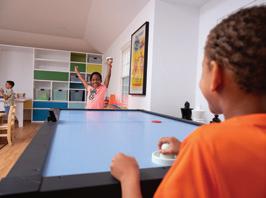
“The Prince & Princess Club is unique. Other hotels have activities and camps, but we’re the first to offer comprehensive services for guests and locals, plus an afterschool care program,” says Christopher.
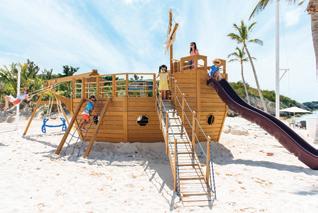
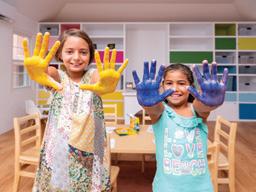
For further details contact: kidsclub.hamilton@fairmount.com or call 295-3000 ext 7844.
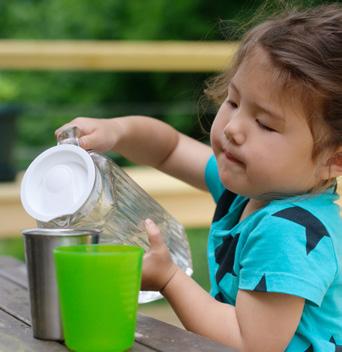
ACTIVITIES INCLUDE:
Local focus on arts and crafts, swimming at hotel pool, tennis with our tennis Pro at Princess Beach Club, art scavenger hunts in hotel, field trips/excursions, kids’ fitness, mindfulness activities and more!
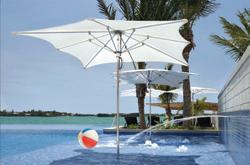
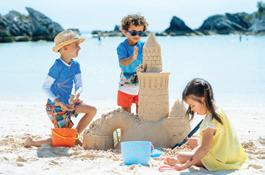
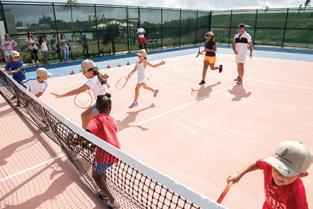

Picnic lunch from Crown & Anchor provided. Location: Prince & Princess Club, 76 Pitts Bay Road ACTIVE WEEKS: JUNE 29 – SEPTEMBER 4
Daily Duration: 8.30am-3.30pm • Price: $350/week Aftercare 3.30-5.30pm: $75/week • Ages: 5-12




Please email kidsclub.hamilton@fairmont.com or call 295-3000 ext 7844 for registration forms


Our unique and individual nurseries provide a variety of activities and opportunities to encourage your child’s development. We provide happy, stimulating, safe and secure environments where children can learn and develop to their full potential. We are an inclusive, high quality Nursery School providing early learning and care for 51 weeks of the year from 8.00 am – 5.30 pm for children aged between 2 and 5 years old. For further information please visit www.once-upon-a-time.net
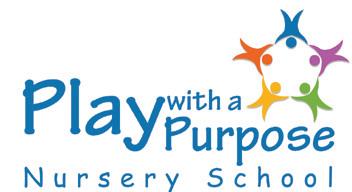
From literacy development to social skills and creative expression, the children at Sweet Pea Nursery are constantly being exposed to new activities and environments in which to thrive. We build on the strengths and interests of each child to help build a solid foundation where they can develop their futures.
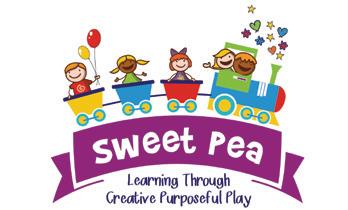
Tel: 232-7217
Email: Sweetpeabda@gmail.com
We believe that play supports all areas of a child’s development. We create a safe and nurturing environment where children are free to learn important skills through their play. We explore the interests of the children to encourage learning and to help develop an understanding of the world around them.

We have three classrooms and accommodate children from 2-5 years.
We are open between 8.15 and 3.30pm every day, during school term times.
Email: admissions@play.bm
Phone: 236 4835
Website: www.play.bm
We support co-educational students in 6th through 12th grades who experience an array of learning challenges, by individualized learning opportunities, executive functioning solutions, while students gain the confidence to drive motivation and goal attainment. Our students utilize core values (community, resilience, integrity, empathy, and leadership) to self-evaluate their behaviors and intentions. All students are valued and celebrated for their individuality and strengths.
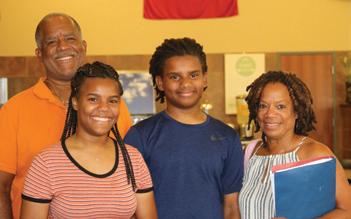
Vanguard Summer Camp takes students through STEAM projects into the great outdoors! We assess student skills, work on Executive Functioning, and build friendships. Our experiences include interactive Adventure Camp (grades 6-12), Credit Retrieval (grades 9-12), or ACT Prep (for juniors and seniors). We are Vanguard.
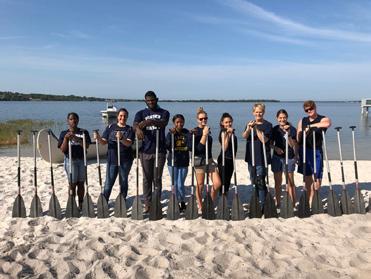
Contact details: www.vanguardschool.org

1-863-676-6091
The Gow School is a college-prep boarding and day school for students, grades 6-12, with dyslexia and similar language-based learning disabilities. Focusing on small class sizes, 3-7 students per class, and a low 4:1 student to faculty ratio, The Gow School offers a multisensory approach to teaching that enables dyslexic students to thrive. The Gow community has a sense of belonging, of equality, and of connection born on common trials and shared triumph.

In July, the school’s co-ed summer program is five weeks of learning and fun for ages 8-16! The Gow School Summer Program is for students who have been experiencing academic difficulties, or have been diagnosed with dyslexia or specific learning disabilities. The Summer Program runs from the end of June to early August with morning academics, afternoon fun and games and weekend adventures! The Gow School Summer Program gives students academic tools and self-confidence they can take with them wherever they go; to the classroom and beyond.
Email: admissions@gow.org
Phone: 716.687.2001

Located just minutes from historic Boston MA, Fessenden is the oldest and most prestigious U.S. boarding school for boys, ages 11-15, in the U.S. Fessenden embraces a student-centered, teacher-supported approach that promotes interactive exchange over direct instruction, collaboration over competition, and learning for life over learning for school.
The Fessenden boarding experience is specifically designed to provide the academic, social, and emotional support boys need during their critical pre-teen/teen years. And, with a weekend program considered to be one of the best in the country, it is no wonder that Fessenden attracts students from across the U.S. and around the globe. Learn more at fessenden.org or call us at 617-620-2300.
Montverde Academy is a diverse community of students representing more than 90 countries. Through engaging academics, clubs and community service efforts, students at all grade levels build a solid foundation of character and commitment that fosters a lifetime of learning and success.


• 100 percent college acceptance rate
• AP® and Honors courses
• 46 clubs and societies
We prepare our students to pursue their dreams. Schedule a personal tour and experience our beautiful 130-acre campus located just 30 minutes from Orlando. Immerse yourself in our community and learn how a Montverde Academy education propels students towards excellence.
Established in 1836 in Quebec, Canada, Bishop’s College School (BCS) is an IB World School offering the International Baccalaureate Diploma Programme and certificates. Situated on a 250-acre campus close to the city of Sherbrooke, BCS is a small, welcoming community with students from over 40 different countries. By embracing a rigorous yet supportive academic program that includes athletics, the arts, leadership and development, and global citizenship, BCS prepares students to become tomorrow’s leaders. We offer a Bilingual Option (English and French), as well as the Duke of Edinburgh’s Award program. We are also a proud member of Round Square through which students can go on exchanges, volunteer for projects in developing countries, attend international conferences, and participate in activities at school and in the local community.
www.bishopscollegeschool.com
admissions@bishopscollegeschool.com


St. Johnsbury Academy offers an extraordinary range of opportunities – more than 200 courses, a fine and performing arts center with a faculty of professional artists, 16 technical, pre-professional and computerscience courses, and four languages. We have 40 athletic teams and nearly 60 clubs. Our student body, comprising 50 local towns, 20 states, and 30 countries, allows students to live and learn in a remarkably diverse community defined by a culture of caring, acceptance, and encouragement.

Nicole Biggie, Director of Admissions, St. Johnsbury Academy, 1000 Main Street St. Johnsbury, VT 05819 (802) 751-2130
admissions@stjacademy.org



















































Hours: Monday - Thursday: 9am -7pm Friday & Saturday: 8:30am - 8:30pm Front Street, Hamilton Tel: 293-1967 or 534-1384
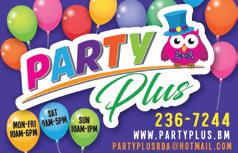

4th Floor Dallas Building, 7 Victoria St Tel: 295-4082 Fax: 295-5245
Email: info@islandnutrition.bm www.islandnutrition.bm
ISLAND NUTRITION IN Registered Dietitians providing Medical Nutrition Therapy
ISLAND NUTRITION IN Prevent and manage medical issues
ISLAND NUTRITION IN Paediatrics: including Poor growth, Behavioural issues, Overweight, Constipation, Allergies, Tube feeding, Weaning

ISLAND NUTRITION IN Adults: including GI, Cardiovascular, Kidney disease, Inflammation, Obesity, Cancer, Wound healing, Pregnancy, Elderly
ISLAND NUTRITION IN Convenient locations including in-office and home visits

ISLAND NUTRITION IN Ask your healthcare provider for a referral or contact our office
ISLAND NUTRITION IN Covered in full by insurance - No copays
carry a large supply of party decorations and supplies for your special occasion
Collaborative learning is a term used to describe a set of educational philosophies which use groups of two or more students, or students and teachers together, to support the exploration or application of course material. Students work together to search for understanding, solve problems or create a product, engaging learners to process and synthesize information and concepts in ways they could not in most traditional classroom settings or on their own.
The twenty-first century student has evolved from 1990, 2000 or even 2010. They are much more aware of
the world socially, environmentally and politically. They engage with and react to the world differently. They think, communicate and learn differently.
Collaborative learning represents a shift away from the typical teacher-centered or lectured-centered classroom setting. It is taught in a variety of forms and is used by educators on all levels in every discipline.

The classroom is filled with multiple perspectives and a variety of learning styles, experiences and aspirations. Collaborative learning settings are more effective than the one-size-fitsall approach, where students are exposed to the perspectives of others and this diversity forces students to think beyond their own point-ofview which challenges their thinking and forces learning.
Learning is an active process. To learn new information,
BY MSAconcepts or skills, students must work actively with the content in meaningful ways. In collaborative learning students create something new with new information. They integrate this new information with what they already know or use it to reorganize what they thought they knew.
Learning depends on the context in which it is received. One of the characteristics of collaborative learning is the immersion of students in challenging tasks or questions. Instead of presenting students with facts or ideas and then moving on to its applications, collaborative learning activities often begin with a problem or set of problems. Students must then discern for themselves, in a group setting, the relevant facts to help them
understand the issue. From there it could be expanded, and students may deepen their understanding to potentially develop a solution. All of this encourages students to develop higher order reasoning and problem-solving skills.
Teachers are no longer teachers. They are facilitators. They make it easier for students to gain knowledge or learn a skill. Collaborative learning is a strategy which goes beyond content mastery to encourage the development of other qualities necessary to produce productive citizens.
Every problem facing the world today, locally, regionally and globally, will require cooperation and teamwork. Students engaged in collaborative learning will encounter students with differing opinions and arguments. Working in groups to a common purpose, students will be forced to recognize perspectives different from their own, find ways to accommodate these perspectives and work together to find solutions, create a product or reach a goal.
Education today must create opportunities to build participation in and a responsibility to the community. 2020 requires students compete with their counterparts on a global scale to find resolutions to global issues. Dialogue, deliberation and consensus-building are the strongest qualities we can build to prepare students for the challenges to come.
Kagan Cooperative Learning is an instructional strategy built upon the collaborative learning philosophy. It was developed by Spencer Kagan, an educationalist and psychologist who wanted to develop an instructional strategy which could actively engage every student in the classroom. Kagan’s strategy suggests a different classroom layout with altered classroom policies and methods to engage students. “Kagan Structures” are designed to minimize the opportunity for students to become distracted by providing them skills to learn independently and the skills to work with others. These structures not only teach students social skills – taking turns,
listening to the views of others and sharing information – but also provide a vehicle by which to deliver course content.
Mount Saint Agnes Academy adopted the Kagan Cooperative Learning strategy four years ago after watching its successes in other districts. During this transition, MSA teachers and students have witnessed the benefits of the strategy, most notably increased student engagement, improved academic performance and greater student commitment to their learning.

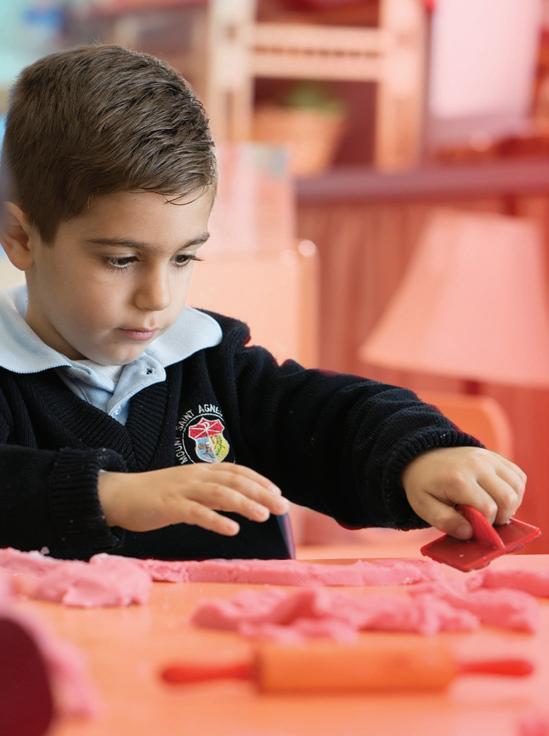
Where students are challenged to think critically and apply problemsolving solutions.
We inspire the innovators.PHOTO PROVIDED
Benjamin Franklin once said, “The bitterness of poor quality remains long after the sweetness of low price is forgotten.” We believe this thought coincides with the more modern quote by Kurt Vonnegut, “In this world, you get what you pay for.”
Finding something at the best price doesn’t always mean you’re getting the best deal. Before making any major purchase, consumers should consider the quality of the goods, and how long they will last. If you buy a sofa for $500 and it lasts 3 years, as opposed to a $1,500 sofa that lasts 10 years, it’s obvious which is the better investment.
At a time when everyone is concerned about saving the planet, it’s amazing how much we have become such a disposable society. When’s the last time you saw a TV repair person? Or tried to get a microwave fixed? Sadly, it is usually more economical to replace those items, than it is to get them repaired.
BY BATESAs we get ready for Spring, we tend to think about being outdoors more, playing and entertaining. Maybe it’s time to get your toddler a playset? And a new grill for Mom and Dad? Or new outdoor furniture for everyone? Before you go looking for the best deal, and spend your hard earned money, consider what these goods are made from. Will the materials hold up in Bermuda’s humid and salty climate? Will the items blow away in strong winds? How long do you want the products to last before you have to replace?
Joshua Bate Trading Bermuda Ltd. can source pretty much anything you
need, but we only become authorized distributors of products we are confident to recommend. For example, Creative Playthings has been making quality children’s playsets in the US since 1951. Solidly constructed of southern yellow pine, their sets are built to last and designed to be upgraded as your family grows. Besides swings and slides, you can add a playdeck, a rock wall, a ladder beam and lots of other fun accessories to keep your kids interested for 10 years or more! Instead of buying an inexpensive set that is sure to rust, develop splinters, or blow away in the next storm, why not invest in a set that’s tough like your kids and may last long enough for your grandchildren to enjoy?
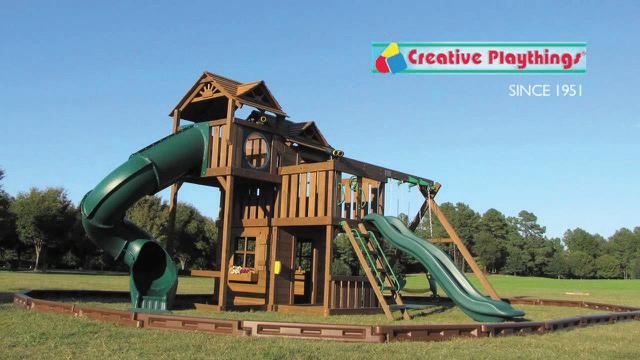
Saber outdoor barbecue grills are built from 304 Commercial Grade Stainless Steel with fully welded 1” steel tube carts and fireboxes to provide superior strength and stability. Their no flex lid design ensures years of smooth operation, while the porcelain coated burner boxes, firebox liners and grease trays allow for easy cleanup. Saber grills are also certified to the highest safety and performance standards available, ensuring safety and reliability. They even have a one-bolt, streamlined assembly process which means you can grill sooner, after purchasing a Saber grill.

Outdoor furniture by Seaside Casual, another US manufacturer, is perfect for Bermuda’s harsh environment because it’s manufactured from Envirowood which resists moisture, fading, insects, splinting, warping and other hazards of environmental exposure. Only marine grade stainless steel (316) fasteners are used to ensure superior protection when exposed to the elements. Plus all frames are constructed with HDPE lumber components that are designed to withstand temperature and load changes and structural aluminum is used to reinforce critical frame members in key locations. The result is a product that will not tip, topple or turn over on your patio, deck or lawn. Stop by BATE’S to take a test drive several of Seaside Casual’s chair styles and see for yourself.

As the largest appliance supplier in Bermuda, we provide all brands of appliances, but we are authorized distributors for only the best which include luxury brands such as Monogram, Sub-Zero, Wolf, Cove, Asko, Café, Scotsman and Best Hoods plus GE for mid-range pricing, and their economy lines Haier and Hotpoint.
After sourcing several brands of mattresses, we finally settled on Sealy for both residential and commercial products. Their signature Posturepedic technology is second to none, plus they provide traditional innerspring mattresses, all-foam (comparable to Tempur-pedic, which is also manufactured by Sealy) and the newest hybrid construction combining both innerspring and memory foam. Sealy’s newest product is the Bed-in-Box (BIB), which is a line of compressed mattresses available with and without innersprings in different thicknesses. They are excellent quality and designed for easy delivery since all sizes fit into the same size box. As the exclusive distributor In Bermuda,
we honour Sealy’s full Warranty on all of their mattresses which you can’t get if you bring in a mattress yourself.
Joshua Bate Trading Bermuda Ltd. has been in business for 28 years because we not only believe in supplying high-quality products, but providing high-quality service as well. Visit our website at www.bate. bm, stop by our showroom BATE’S in Devonshire or give us a call at 236-7866. Let us show you the benefits of highquality products and service, to demonstrate that you truly get what you pay for.
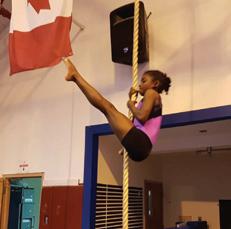
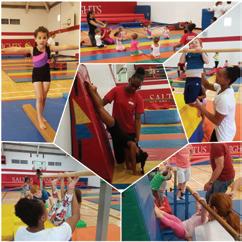

Classes for all ages - from Tots to Adults, and all ages in between
Classes for boys and girls
Classes at Saltus on Saturday, other days of the week up at the gym in St David’s.
Largest gymnastics facility on the island Fully equipped, and has a trampoline, tumble track and foam pit
Birthday parties also available
Registration open now for the Spring Term
Learn fun gymnastics skills whilst making new friends
Beginners
Beginner

Entrepreneurship is rapidly becoming the first career choice for graduating students. Often getting their start out of a home office, students are proving to be the fastest growing segment of upcoming entrepreneurs. These self-motivated young people are writing success stories and changing the way business is perceived in modern society. Successful entrepreneurs have consistent characteristics –most are risk-takers, visionaries, leaders and are adaptable, competitive, driven, confident, persuasive, and understanding. If your child can identify with any of these characteristics, you definitely want to consider encouraging entrepreneurship. However, if none of those characteristics resonate, your student can be an entrepreneur too; here’s why. Although everyone may have an inherent aptitude for a certain discipline or subject, any skill can be learned, including those that make for a successful entrepreneur.
The key to learning how to be an entrepreneur is in experience. Neil Kane, director at Michigan State University’s
BY KELSEA WILLIAMS, COMMUNICATION & DEVELOPMENT OFFICER, BEDCundergraduate entrepreneurship and innovation programme, says, “Entrepreneurism must be practiced to be learned. It is experiential. Just as you can’t learn to swim at the library, you can’t learn what entrepreneurship is about unless you experience it.” Students don’t have to wait until they get to college to start developing an entrepreneurial mindset. The Bermuda Economic Development Corporation (BEDC) offer’s a program, tailored specifically for young people, between the ages of 16yrs – 25yrs, aimed at helping young people to develop entrepreneurial skills. The BEDC Summer Student Entrepreneurship Program (SSEP) combines entrepreneurship education with real-life entrepreneurial experience. The fun, interactive, intensive program is a great way for students to test the waters and decide if entrepreneurship is really for them.
Studying entrepreneurship serves as an excellent foundation for the types of creative and innovative ideas needed to succeed and compete in the 21st

century. It teaches people how to cultivate unique skills and encourages them to think outside the box. Learning entrepreneurship exposes students to numerous opportunities to learn how to think critically, analyze and be aware of all of the factors that lay the foundation of the decision-making process. This is not something that can be learned from a book. Students have to be exposed to real-world examples and learn from their own experience. While participating in the Summer Student Entrepreneurship Program, students become the CEO’s of their own businesses. They make real-life decisions, purchases, sales and truly experience what it is like to be an entrepreneur.

At BEDC we have found that graduates of the Summer Student Entrepreneurship Programme leave with a unique mindset. They are able to find problems that need to be solved, invent a solution for them, and, ultimately, make the world a better place. For more information on how to be a part of the Summer Student Entrepreneurship Programme, visit our website, www.bedc.bm. Learning how to become an entrepreneur in Bermuda can be a confusing process. The BEDC offers free business advices and guidance to help. Give us a call at (441) 292-5570 or email us today at info@bedc.bm.

Promoting students by their age, regardless of their skill mastery, doesn’t work for everyone. This practice, originally thought to help most students’ selfesteem, can actually do the opposite. Children who struggle academically and continue to advance grade levels, can fall further behind and are at-risk for anxiety, depression and risky behaviors that can have long-term
negative consequences. Without having an assessment to determine why students aren’t able to read, have weak reading comprehension, or fail to retain math concepts, the wait-and-see method is really a wait-to-fail model.
The Bermuda Centre for Creative Learning (BCCL), began in 2015 for students who have been assessed and diagnosed with a languagebased learning difference. Dyslexia,
(ADHD) and expressive and receptive language delays, can get in the way of learning in traditional school environments. The BCCL team continually researches and implements best-teaching practices for students who thrive in flexible classrooms with a holistic and nurturing approach. Students work in small groups that focus on their individual
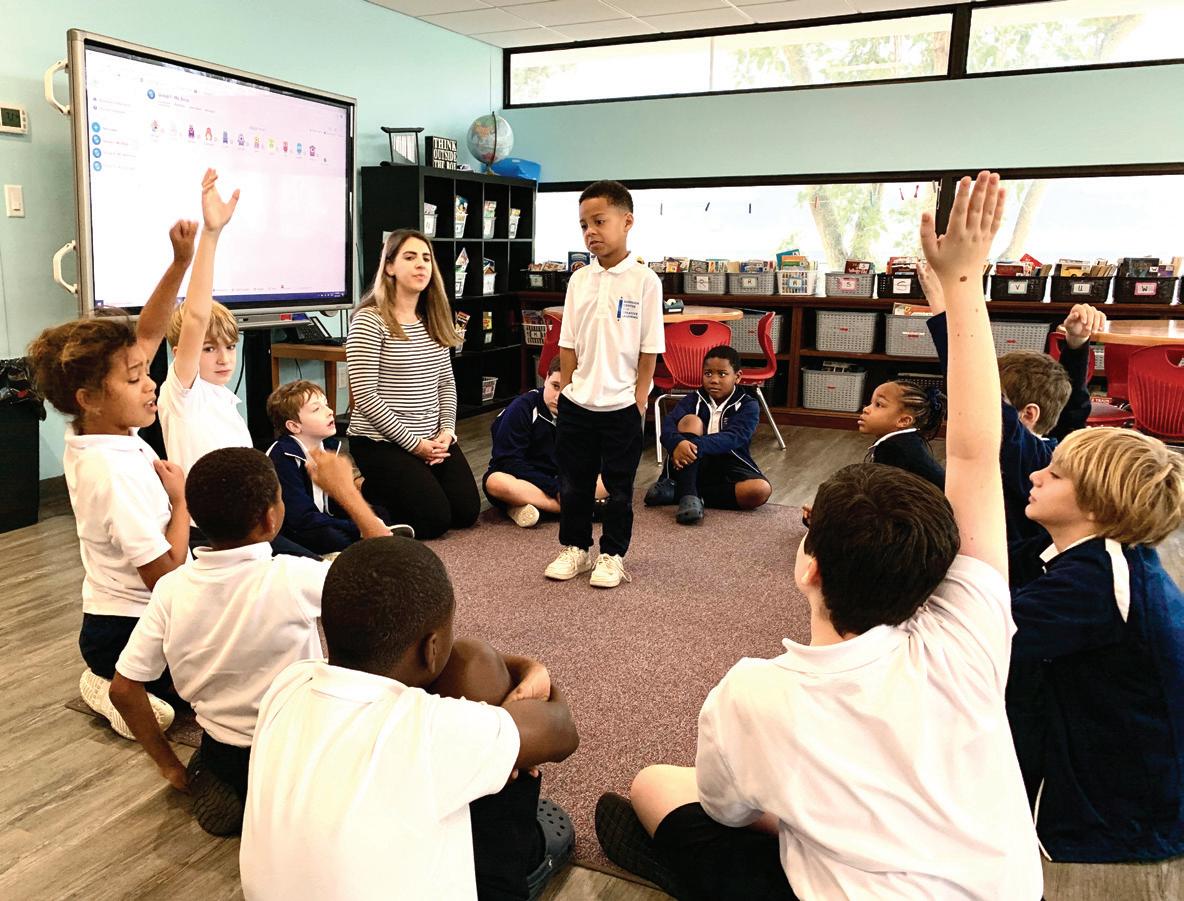
skill level. Teachers personalize their learning, continually track the concepts they retain, and students can move up year levels when they are ready. Project-based learning (PBL) is incorporated, providing meaningful student-centered opportunities. Students work more independently through the PBL process, with the teacher acting as a guide, providing support when needed. Students
are encouraged to make their own decisions about how best to do their work and demonstrate what they know. They begin to take ownership of their learning, which increases their self-confidence. Through a holistic approach, students participate in daily mindfulness sessions, physical education and weekly school clubs and yoga lessons. The use of personalized learning and a nurturing environment leads to healthy and positive school experiences.
The enrollment process includes having prospective students spend an ‘Experience Week’, to assess their English and math skills and have a better understanding of their learning style. Students can begin at age 6 and remain at BCCL until they are ready to transition to secondary school at age 15. Visit www.bccl.bm to learn more, or call 824-1111 to schedule a tour.
BCCL was created for children starting at age 6, who have learning differences and learn best in a non-traditional environment that facilitates each student’s individual learning style.
Prior to enrolling at BCCL, students are required to be assessed on island or away and have been diagnosed with learning differences, such as dyslexia, auditory processing disorder, ADHD and other language-based disorders. BCCL is recognised as a private school by the Bermuda Ministry of Education.
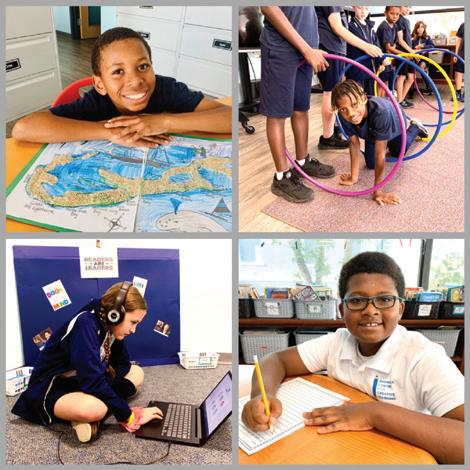
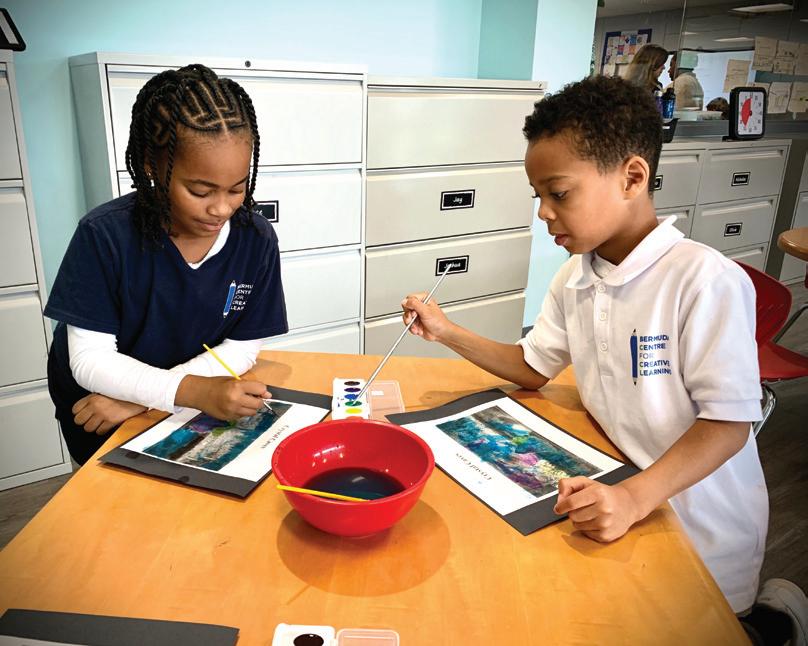
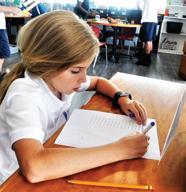

Contact us
Bermuda Centre for Creative Learning



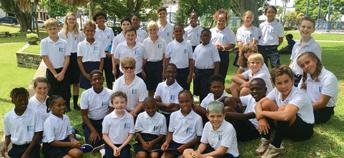
41 Cedar House North Cedar Avenue
Hamilton, Bermuda HM 12
Telephone 1.441.824.1111
Email info@bccl.bm
Website www.bccl.bm
Charity #985
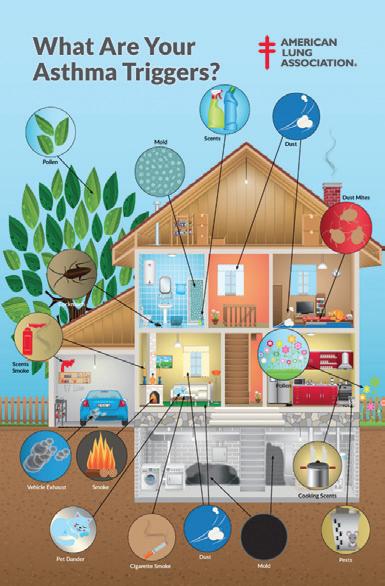 BY OPEN AIRWAYS
BY OPEN AIRWAYS
Asthma is a condition that affects the airways-the small tubes that carry air in and out of the lungs.
If you have asthma your airways are extra sensitive.
Your sensitive airways will react to a variety of triggers. The lining of the airway will become inflamed and swollen, sticky mucous will be produced and the airway will narrow making it harder to breathe.
That’s why it’s so important to take your preventer inhaler every day. The preventer controls and reduces the inflammation in your airways, so you’ll be less likely to react to your asthma triggers.

An asthma trigger is anything that can set off your asthma symptoms. Common triggers include colds and viruses, pets, cigarette smoke, cold weather and pollen.
Everyone with asthma will have their own personal triggers, it is helpful to know what your triggers are so you can avoid them if possible.
You may not be able to avoid all your triggers but there are some simple steps you can follow to limit your exposure and so help control your asthma.
Sometimes it’s obvious what your triggers are, for example, when your symptoms start after exposure to a cat or dog, or when you’re around people smoking.
But sometimes it can be harder to pinpoint what’s causing your symptoms, perhaps because it’s a trigger like grass pollen, or dust mites, which you can’t see. Or because your reaction is delayed or builds up over a few days.
In an asthma attack, the airway lining starts to swell, the muscles tighten and mucous is secreted.
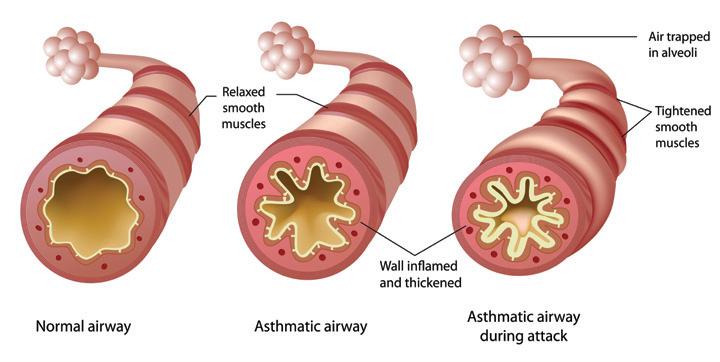
Common triggers include:
• Viral infections (colds or flu)
• Allergens such as pollen, grasses, animal dander, house dust mites, moulds and cockroaches.
• Smoke
• Irritants - household sprays & chemicals, plug in air fresheners, perfume, paint & varnishes.
• Air pollution -particularly diesel fumes
• Exercise
• Emotion
• The weather
How to avoid triggers
• Do not use household sprays or aerosols - clean without chemicals using microfiber cloths, a steam cleaner or damp mop and a vacuum with a HEPA filter.

• Do not use plug-in air fresheners or sprays.
• Do open windows every day.
• Do have houseplants (without pollen) to freshen the air.
• Do not bring Easter lilies into your home.
• Do not walk along busy roads, walk in the parks, on the trails and beaches.
• Do not allow smoking in your home.
• Do not encourage your child to have too many stuffed toys, place
in freezer weekly for 6 hours to kill the dust mites.
• Do not have carpets in your home, wood or tile floors are much better.
• Do not have pets in the bedroom.
• Do buy a new pillow every year.
• Do wash bed linens weekly in hot water.
• Allow your bed to air before making it. Turn your mattress every month.
• Do not use perfume.
• Do eat a healthy diet and exercise regularly.
• Swimming is good for your airways.
• Playing a wind instrument such as a trumpet is also very good for the airways.
• Do deep breathing exercises –join a Yoga class.
The Open Airways nurses Tracy Nash & Liz Boden do home visits to help anyone with asthma.
In a free one hour visit our nurses can assess the home environment and offer suggestions on how to avoid your asthma triggers. They can also advise on asthma treatments, inhaler technique and provide spacers if needed.
If you have any questions or would like to see the asthma nurse for an asthma review please contact Open Airways 232 0264 or email nurse@openairways.com
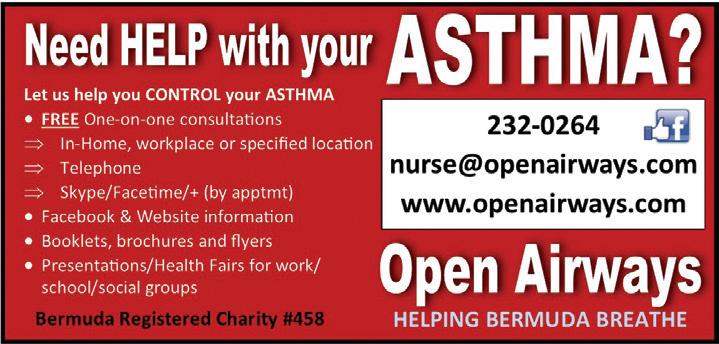


Concern over this new virus can make children and families anxious. While we don’t know where and to what extent the disease will continue to spread, we do know that it is contagious, that the severity of illness can vary from individual to individual, and that there are steps we can take to prevent the spread of infection. Acknowledging some level of concern, without panicking, is appropriate and can result in taking actions that reduce the risk of illness. Helping children cope with anxiety requires providing accurate prevention information and facts without causing undue alarm.
It is very important to remember that children look to adults for guidance on how to react to stressful events. If parents seem overly worried, children’s anxiety may rise. Parents should reassure children that health and school officials are working hard to ensure that people throughout the country stay healthy. However, children also need factual, age appropriate information about the potential seriousness of disease risk and concrete instruction about how to avoid infections and spread of disease. Teaching children positive preventive measures, talking with them about their fears, and giving them a sense of some control over their risk of infection can help reduce anxiety.
• Remain calm and reassuring.
• Children will react to and follow your verbal and nonverbal reactions.
• What you say and do about COVID-19, current prevention efforts, and related events can either increase or decrease your children’s anxiety.
• If true, emphasize to your children that they and your family are fine.
• Remind them that you and the adults at their school are there to keep them safe and healthy.
• Let your children talk about their feelings and help reframe their concerns into the appropriate perspective.
• Make yourself available.
• Children may need extra attention from you and may want to talk about their concerns, fears, and questions.
• It is important that they know they have someone who will listen to them; make time for them.
• Tell them you love them and give them plenty of affection.
• Avoid excessive blaming.
• When tensions are high, sometimes we try to blame someone.
• It is important to avoid stereotyping any one group of people as responsible for the virus.
• Bullying or negative comments made toward others should be stopped and reported to the school.
• Be aware of any comments that other adults are having around your family. You may have to explain what comments mean if they are different than the values that you have at home.
• Monitor television viewing and social media.
• Limit television viewing or access to information on the Internet and through social media. Try to avoid watching or listening to information that might be upsetting when your children are present.
• Speak to your child about how many stories about COVID-19 on the Internet may be based on rumors and inaccurate information.
• Talk to your child about factual information of this disease—this can help reduce anxiety.
• Constantly watching updates on the status of COVID-19 can increase anxiety—avoid this.
• Be aware that developmentally inappropriate information (i.e., information designed for adults) can cause anxiety or confusion, particularly in young
• Engage your child in games or other interesting activities instead.
• Maintain a normal routine to the extent possible.
• Keep to a regular schedule, as this can be reassuring and promotes physical health.
• Encourage your children to keep up with their schoolwork and extracurricular activities, but don’t push them if they seem overwhelmed.
• Be honest and accurate.
• In the absence of factual information, children often imagine situations far worse than reality.
• Don’t ignore their concerns, but rather explain that at the present moment very few people in this country are sick with COVID-19.
• Children can be told this disease is thought to be spread between people who are in close contact with one another—when an infected person coughs or sneezes.
• It is also thought it can be spread when you touch an infected surface or object, which is why it is so important to protect yourself.
The CDC believes these symptoms appear in a few days after being exposed to someone with the disease or as long as 14 days after exposure:
• Fever
• Cough
• Shortness for breath
• For some people the symptoms are like having a cold; for others they are quite severe or even life threatening. In either case it is important to check with your child’s healthcare provider (or yours) and follow instructions about staying home or away from public spaces to prevent the spread of the virus.
• Review and model basic hygiene and healthy lifestyle practices for protection.
• Encourage your child to practice every day good hygiene—simple steps to prevent spread of illness:
• Wash hands multiple times a day for at least 20 seconds (singing Twinkle, Twinkle Little Star slowly takes about 20 seconds).
• Cover their mouths with a tissue when they sneeze or cough and throw away the tissue immediately, or sneeze or cough into the bend of their elbow. Do not share food or drinks.
• Practice giving fist or elbow bumps instead of handshakes. Fewer germs are spread this way.

• Giving children guidance on what they can do to prevent infection gives them a greater sense of control over disease spread and will help to reduce their anxiety.
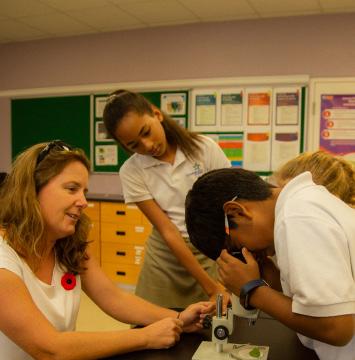
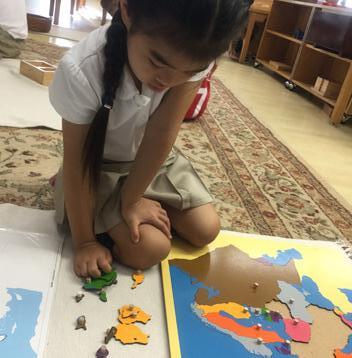
• Encourage your child to eat a balanced diet, get enough sleep, and exercise regularly; this will help them develop a strong immune system to fight off illness.
You know your children best. Let their questions be your guide as to how much information to provide. However, don’t avoid giving them the information that health experts identify as critical to ensuring your children’s health. Be patient; children and youth do not always talk about their concerns readily. Watch for clues that they may want to
talk, such as hovering around while you do the dishes or yard work. It is very typical for younger children to ask a few questions, return to playing, then come back to ask more questions.
When sharing information, it is important make sure to provide facts without promoting a high level of stress, remind children that adults are working to address this concern, and give children actions they can take to protect themselves.
Information is rapidly changing about this new virus—to have the most correct information stay informed by accessing https://www.cdc.gov/ coronavirus/2019-ncov/index.html.
Reference
https://www.nasponline.org/resourcesand-publications/resources-and-podcasts/ school-climate-safety-and-crisis/health-crisisresources/talking-to-children-about-covid-19(coronavirus)-a-parent-resource

